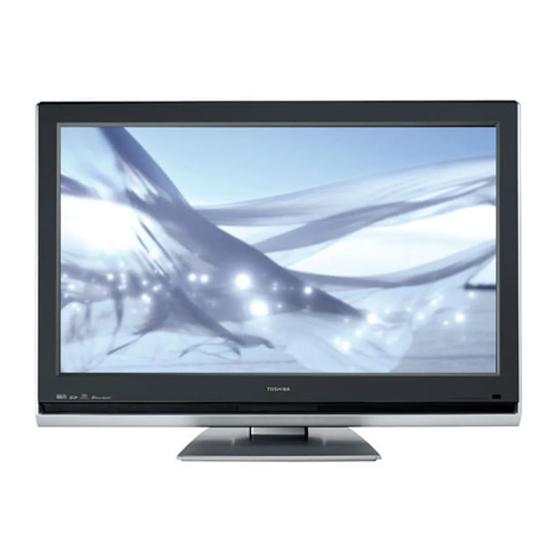- ページ 2
テレビ Toshiba 15V31のPDF オーナーズマニュアルをオンラインで閲覧またはダウンロードできます。Toshiba 15V31 30 ページ。 Home cinema catalogue 2005-6
Toshiba 15V31 にも: カタログ (21 ページ)

This equipment has been designed and manufactured to meet international safety standards but, like any electrical
equipment, care must be taken if you are to obtain the best results and safety is to be assured. So, please read the
points below for your own safety.
consumer products and some points may not apply to the goods you have just purchased.
Air Circulation...
Air Circulation...
Air Circulation...
Air Circulation...
Leave at least 10cm clearance around the television to
allow adequate ventilation. This will prevent the TV
from overheating and consequential possible damage
to the TV. Dusty places should also be avoided.
Heat Damage...
Heat Damage...
Heat Damage...
Heat Damage...
Damage may occur if you leave the TV in direct sunlight
or near a heater. Avoid places subject to extremely high
temperatures or humidity, or locations where the
temperature is likely to fall below 5 C (41 F).
Mains Supply...
Mains Supply...
Mains Supply...
Mains Supply...
The mains supply required for this equipment is
230-240V AC 50Hz. Never connect to a DC supply
or any other power source. DO ensure that the TV is
not standing on the mains lead. In the UK, the fuse
fitted in this plug is 5A, and is approved by ASTA
or BSI to BS1362. It should only be replaced by a
correctly rated and approved type and the fuse cover
must be refitted. IF IN DOUBT PLEASE CONSULT
A COMPETENT ELECTRICIAN.
TO FULLY DISCONNECT THE TV, SWITCH OFF
THE MAINS SOCKET AND REMOVE THE POWER
PLUG.
Do...
Do...
Do...
Do...
DO read the operating instructions before you attempt
to use the equipment.
DO ensure that all electrical connections (including the
mains plug, extension leads and inter-connections
between pieces of equipment) are properly made and
in accordance with the manufacturers' instructions.
Switch off and withdraw the mains plug before making
or changing connections.
DO consult your dealer if you are ever in doubt about
the installation, operation or safety of your equipment.
DO be careful with glass panels or doors on
equipment.
3N70401A/COVER
SETTING UP
SETTING UP
SETTING UP
SETTING UP
For your safety
They are of a general nature, intended to help you with all your electronic
2
Do not...
Do not...
Do not...
Do not...
DON'T remove any fixed cover as this may expose
dangerous voltages.
DON'T obstruct the ventilation openings of the
equipment with items such as newspapers,
tablecloths, curtains, etc. Overheating will cause
damage and shorten the life of the equipment.
DON'T allow electrical equipment to be exposed to
dripping or splashing or objects filled with liquids,
such as vases, to be placed on the equipment.
DON'T place hot objects or naked flame sources,
such as lighted candles or nightlights on, or close to
equipment. High temperatures can melt plastic and
lead to fires.
DON'T use makeshift stands and NEVER fix legs with
wood screws. To ensure complete safety, always fit the
manufacturer's approved stand or legs with the fixings
provided according to the instructions.
DON'T listen to headphones at high volume, as such
use can permanently damage your hearing.
DON'T leave equipment switched on when it is
unattended, unless it is specifically stated that it is
designed for unattended operation or has a standby
mode. Switch off using the switch on the equipment
and make sure your family know how to do this.
Special arrangements may need to be made for
infirm or handicapped people.
DON'T continue to operate the equipment if you are
in any doubt about it working normally, or it is
damaged in any way – switch off, withdraw the mains
plug and consult your dealer.
DON'T throw your old batteries into a fire, dispose of
them in a designated disposal area.
ABOVE ALL – NEVER let anyone, especially
children, push anything into holes, slots or any
other openings in the case – this could result in a
fatal electric shock.
NEVER guess or take chances with electrical
equipment of any kind – it is better to be safe
than sorry.
7/4/03, 5:14 PM
